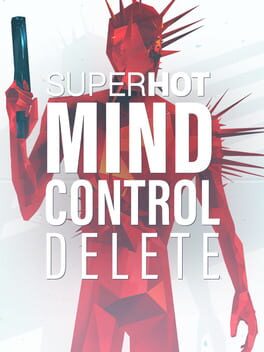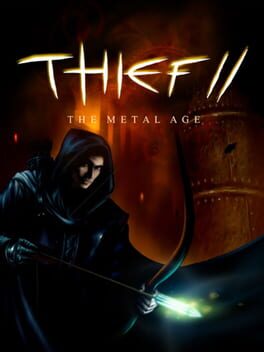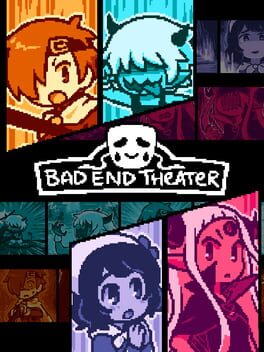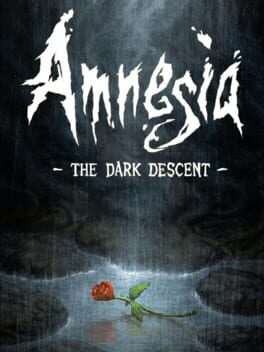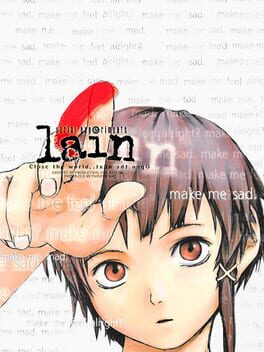Snel
1997
yeah no these games kinda blow. Like most people I didn't actually finish this. You can cite the long, tedious hours spent replaying the same five or some levels as the point when the point was already evident the moment you entered a fake virtual space to kill droves of fake humanoids for your fake John Wick/Neo bullet-time roleplay sim. The first SuperHot, however witless, is commendable for not engaging you on any kind of moralistic standpoint. It understands not to blame decadence on video games. Let alone video game violence. That the reason people go to them isn't out of derogatives like degeneracy or incelibacy but—like all technology—spectacle. That only when granting us what we desire, divorced from meaning, do they become harmful. The logical sequel to such a game could only be one thing: redundant. Mind Control Delete's subversion? Be even more redundant and somehow less clever! God, is it to anybody's suprise even fans of the gameplay can't enjoy it without the added contextualization of their own background music? Watch Videodrome or read McLuhan instead, spare yourself the bore.
2021
2012
Pretty god awful Resident Evil game that does away with all the liminal eeriness and meditative downtime even 5 had shimmers of in favor of some prime-cut ham and questionably intentional campiness. Tragic as that may be, why shouldn't this series reinvent the wheel as it's so often done? Resident Evil was basically an Eastern game company's attempt at rivaling western horror sensibilities anyway; why shouldn't that grow to involve American military shooters so popular during the 7th generation? Why can't Leon Kennedy jump between skyscrapers while fighting a kaiju-sized eugenicist with generic a 9mm pistol to avenge the president? Had Capcom continued down this trajectory of co-op campaigns instead of retreating to the safety of remakes we'd probably have some of the finest to talk about right now.
2001
It’s cool to see how much the world changes between these entries: From pilfering ancient tombs protected by curses as solemn and mysterious as the lost civilizations that inscribed them to spiritless, autonomously guarded pho-cultured banks and art exhibitions / Secular and religious authorities existing practically on the fringes of unmeasured magical wilderness to partnering in the creation of an industrialized surveillance state / Outwitting an actual pagan god to a technocratic zealot with an infantilized god complex.
Throughout all this, it’s easy to forgot that Garrett’s ark is essentially one about faith. Beginning in The Dark Project when his arrogance very nearly causes the end of the world, billowing into his smarmy attitude towards religion at the start of The Metal Age and concluding when he finally chooses to believe in the keeper’s prophecies after they once again come true. It’s not that religion is perfect or anything (hammerites and pagans aren’t exactly your allies in Thief I) but that it still retains at least some cultural acknowledgment of cosmological inferiority, which “enlightened” modernity so eagerly attempts to exorcise under a steel cross.
Almost as good as Thief I if not for that last string of levels which are total stinkers. Ctrl + Alt + Shift + Del ty very much.
Throughout all this, it’s easy to forgot that Garrett’s ark is essentially one about faith. Beginning in The Dark Project when his arrogance very nearly causes the end of the world, billowing into his smarmy attitude towards religion at the start of The Metal Age and concluding when he finally chooses to believe in the keeper’s prophecies after they once again come true. It’s not that religion is perfect or anything (hammerites and pagans aren’t exactly your allies in Thief I) but that it still retains at least some cultural acknowledgment of cosmological inferiority, which “enlightened” modernity so eagerly attempts to exorcise under a steel cross.
Almost as good as Thief I if not for that last string of levels which are total stinkers. Ctrl + Alt + Shift + Del ty very much.
Doki Doki Literature Club’s merit can be easily measured against that of other transgressive media like Spec Ops: The Line or something closer to its kin like School Days by noting that it breaks the fourth wall not only to deliver incisive subversions of the dating simulator hell world but a heartfelt ode directly to the player in its conclusion.
2021
Stories about technology and its foremost extension—the artificial simulation of consciousness, are typically best when they are as much about their potential to supplant humanity as they are sending us to a higher evolutionary stratum. It is too early to assess whether the retribalized digital age will spell destitution or reunite us in singularity so it is probably better to hold off on value judgments and stick with reports upon reality. This is why, as with most science fiction stories, the post-apocalypse of Planetarian is brought about by humanity's technological hubris and not the prevalence of tech itself. After all, it is the humble programming of a talkative pre-war gynoid that redirects the last man's eyes away from the folly of Earth and back towards the stars above. The irony of our greatest technological mirror image inspiring us through the most primeval of human traditions—oral storytelling—is manifest and brilliant. Were it not for its excessively mawkish ending, it'd easily rank among the finest gateway visual novels that aren't monstrously lengthy. As it is, it's pretty alright. Once we finally get our heads out of the gruel and start colonizing the stars we should give our A.I. moe personification.
2020
"Virtually all works on mental illness and psychiatry are about what goes on in the heads of either mental patients or psychiatrists. In the former class fall the tragedies written by former patients, novelists, philosophers, and some mental health professionals about what they—the sufferers or those who sympathize with them—think is going on in the minds of the mentally ill: these are called the inner experiences of the insane and the torments inflicted on them by others. In the later class fall the comedies written by psychiatrists, psychoanalysts, and other professionals about what they—the scientists and therapists eager to understand and help the helpless—think is going on in the minds of mental patients and what ought to be done about it: these are called the scientific theories and therapeutic techniques of psychiatry."
2012
It's almost too familiar. The futile thumbing through articles of psychobabble in some vain attempt to give a somatic labeling to a conflicted psyche. The psychosexual allure of technology and the internet as potential transcendence from corporeal responsibility. The well-intentioned failures of institutional psychiatry and ultimately, the all too human desire to connect with the other in a century that increasingly obscures and polarizes our conception of the self. The very narrative happening in our minds and at our screens through the lenses of those most helpless and affected.
2018
Probably my least favorite brand of dream logic where the azure color schemes and phantasmagorical creatures are all in-service of some utterly banal and obnoxiously representational pop-psychology like grief or depression, which is really only half the equation I'd wager. The rest should be ungraspable.
2012

